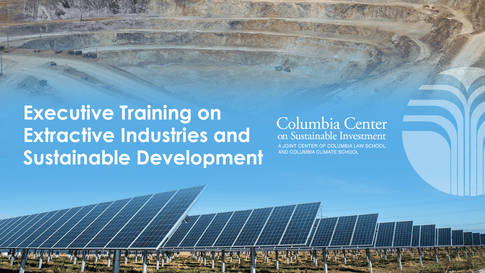2024 Executive Training on Extractive Industries and Sustainable Development
Investments in the extractive industries (oil, gas, and mining) have the potential to be a springboard for development in many low- and middle-income countries, through major tax revenues, technology transfer, infrastructure development, employment, and capacity building. However, reaping those benefits is challenging, and more often these investments have been a source of corruption, social degradation, resource dependency, and environmental catastrophe. Their value chains also account for most of the greenhouse gas emissions that cause the global climate emergency.
How then can resource-rich countries faced with this double-edged sword turn petroleum and mineral resource wealth into long-term sustainable development while mitigating negative externalities, including the direct and indirect impact of the extractive industries on the global climate system?
To leverage natural resources for sustainable development, countries face a number of challenges related to the development and enforcement of a robust legal and fiscal framework; revenue forecasting, management, and allocation; development planning and implementation; infrastructure design and regulation; supply chain development; vocational training; and environmental protection; among others. Achieving climate goals requires policies on mine decarbonization, responsible supply of critical minerals (both from primary extraction and through circular economy approaches), and a just transition away from fossil fuels.
The program is designed to equip participants with the necessary skills to promote the responsible development of the extractive industries in resource-rich developing countries and to encourage a rich dialogue about best practices from around the globe. The two-week training emphasizes the interdisciplinary nature of resource-based development. By working through case studies and with practitioners and experts in the field, participants will be able to apply analytical tools and frameworks to the unique context of the extractive industries in their country.
Frequently Asked Questions
The program is designed for mid-level public sector officials and civil society representatives from resource-rich developing countries, whose responsibilities relate to the development or management of the extractive industries sector. A select number of representatives from the private sector and development agencies may also be admitted.
Please note that we are requiring a $1500 program fee from all accepted participants, with a limited number of partial or full scholarships available for candidates from low-income countries or civil society organizations.
CCSI adheres to the following cancellation and refund policies for all executive trainings:
- Cancellation with 30-days notice: for cancellations made within 30 days prior to the scheduled event, no refund will be allowed for any reason.
- Cancellation with 60-days notice: for cancellations made within 60 days prior to the scheduled event, the $1500 fee will be refunded.
- Cancellation by CCSI: CCSI reserves the right to cancel any event at any time. Should this take place, a full refund will be offered.
Complete and submit this application form. Applications will be considered on a rolling basis until April 30, 2024.
The course draws on faculty from Columbia University as well as other experts from around the world, teaching on specific topics related to their expertise. Past faculty has included:
- Jeffrey D. Sachs, Director, Center for Sustainable Development, Columbia University, and Special Advisor to the United Nations Secretary-General
- Saleem Ali, Blue and Gold Distinguished Professor of Geography, University of Delaware, and Honorary Professor, Sustainable Minerals Institute, University of Queensland
- Andrew Bauer, Public Finance Expert
- Leila Kazemi, Political Economist and Senior Fellow, CCSI
- Tom Mitro, Co-Founder, Graduate Certificate in Global Energy, Development and Sustainability, University of Houston
- Antonio Pedro, Director, Sub-regional Office for Central Africa, United Nations Economic Commission for Africa
- Cristina M. Villegas, Director of Sustainable Markets, Pact
- Senior economics, legal and policy staff of CCSI
If you have any questions about the program or if you would be interested in sponsoring participants in the program, please contact us at [email protected].

